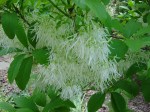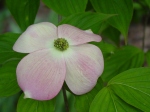“Now the gardener is the one who has seen everything ruined so many times that (even as his pain increases with each loss) he comprehends – truly knows – that where there was a garden once, it can be again, or where there never was, there can be a garden so that all who see it say, “Well, you have favorable conditions here. Everything grows for you.” Everything dies for everybody, too.
There are no green thumbs or black thumbs. There are only gardeners and non-gardeners. Gardeners are the ones who ruin after ruin get on with high defiance of nature herself, creating, in the very face of her chaos and tornado, the bower of roses and the pride of irises.” Henry Mitchell The Essential Earthman
 Working in the landscape business I hear countless times that clients, and friends and neighbors, have brown or black thumbs, but there’s no physical characteristic that determines that a person can’t keep plants alive. The process of successful gardening is fairly simple, though fraught with failures small and otherwise. Green thumbs are obtained with a bit of knowledge, preparation, and sweat of labor. This need not be so complex as it would seem.
Working in the landscape business I hear countless times that clients, and friends and neighbors, have brown or black thumbs, but there’s no physical characteristic that determines that a person can’t keep plants alive. The process of successful gardening is fairly simple, though fraught with failures small and otherwise. Green thumbs are obtained with a bit of knowledge, preparation, and sweat of labor. This need not be so complex as it would seem.
Knowledge
While seemingly obvious, choosing the correct plant for a location is often undertaken without an inkling of an idea about whether the plant will survive the conditions in that spot (the sun, shade, heavy clay, or root competition), or whether it will grow to overwhelm neighboring plants or structures. Garden magazines and books are often chock full of spectacular photos of plants at their best, but the specific requirements of the plant  are left to your imagination. And you imagine that yours will look like dead sticks by June.
are left to your imagination. And you imagine that yours will look like dead sticks by June.
Magazine and book articles devoted to specific plants will provide more information, but there is still no guarantee that the plants will work in your garden, or even your state. Local landscape designers or gardeners can provide practical solutions, or you can look around and witness for yourself. There are a wealth of resources, from public gardens to our neighbor’s backyard, if you’ll pay attention and note what you see. I usually sift through the available information and then give a plant a try, and if it seems to be failing, move it.
Preparation
The Washington DC area has generally lousy soils, with the areas in northern Virginia I live and work having mostly clay to almost shale. Everybody is certain to have a brown thumb if they don’t improve the soil around here. I understand from local garden writers that you must double dig, or rototill to a foot in depth to improve the garden’s soil, but that’s a heck of a lot of work (and many tillers won’t go that deep), and I don’t want to do it, and I don’t think that many customers want to pay for it.
I prefer to plant in raised beds, adding good topsoil over the lousy native ground. Even if you only add a couple of inches of good soil, doing this improves drainage, and I’ve found that plants thrive. Raised beds can dry out quicker, but this is a very small sacrifice to make .
Sweat
I don’t like to, and as I get up in years I can’t do it like I used to. So, I don’t. Now, I have more garden than any handful of neighbors, but I’m not a slave to it. I’ve landscaped about half of my one and quarter property, and have six ponds, and I spend less time in maintenance than I do mowing.
 I don’t re-mulch. I use pine bark nugget mulch when I plant a bed initially because it lasts longer than shredded hardwood. It’s a bit of pain since it blows around and floats out of the bed areas, but I don’t have to replenish it before the plants get big enough to do without. I plant enough filler plants, perennials, annuals, and tropicals to fill the open areas until the larger plants grow. If there are plants growing then weeds won’t fill the open areas.
I don’t re-mulch. I use pine bark nugget mulch when I plant a bed initially because it lasts longer than shredded hardwood. It’s a bit of pain since it blows around and floats out of the bed areas, but I don’t have to replenish it before the plants get big enough to do without. I plant enough filler plants, perennials, annuals, and tropicals to fill the open areas until the larger plants grow. If there are plants growing then weeds won’t fill the open areas.
And there will always be weeds. The key to keeping them in check is not to let them get away from you. Once weeds go to seed you’re in big trouble. So, while I’m walking through the garden I’ll pull a few here and there, and it seems to work in keeping up. Every once in a while I get behind and have to pull out the heavy artillery, RoundUp. Glyphosphate kills just about everything , and makes it possible for me to keep up without an army of gardeners.
I don’t care about insects. If I didn’t have so darn many plants I might care if this one or that was nibbled a bit, but my garden has enough to share. I’ve had a few times that I needed to take care of aphids on the crape myrtle, or lace bug on the pieris and azaleas, but I don’t make a habit of it and rarely are any plants disfigured to any degree.
Except deer. I’m a little into the country, and we’ve always had some deer around, but they’ve discovered my garden in the past couple years. I have so many varieties of hostas that I lost track a long time ago, and of course the deer love them. The Wife is particularly aggravated by them, so she has been on a mission to spray to keep them away. This year she promises to be more vigilant.
‘Rocket surgery” is what we call a mixed metaphor…. it is either “rocket science” or “brain surgery”. Your choice…..
I always say “better to have mixed than to have never metaphored at all”.
Dave